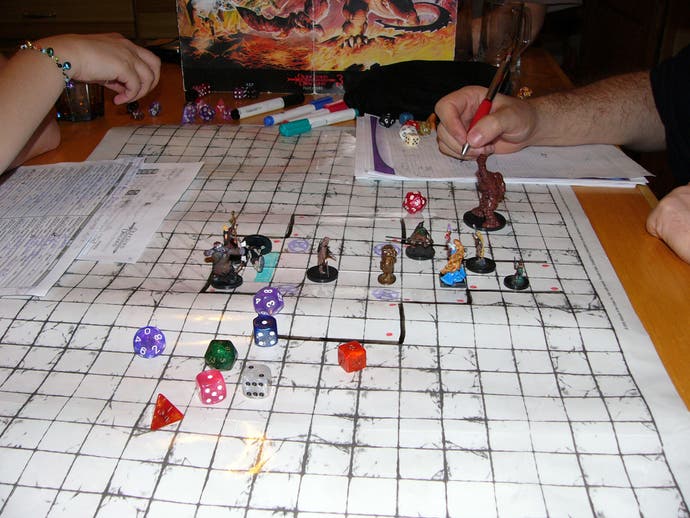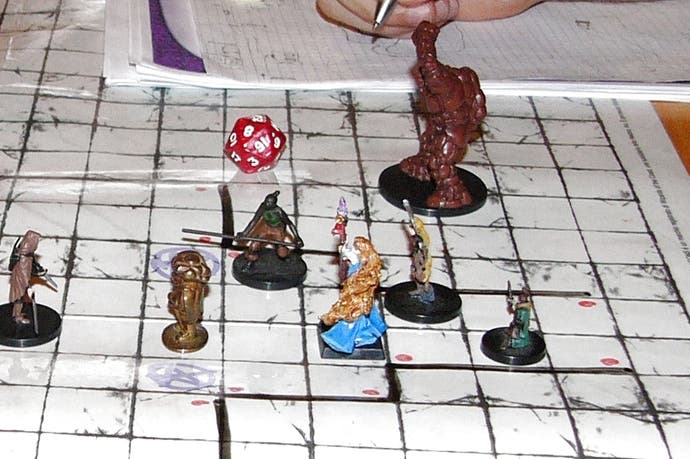The future of RPGs according to Obsidian's Urquhart and BioWare's Muzyka
"Putting the water cooler into the game."
Two of the most influential role-playing game makers in the West - Obsidian boss Feargus Urquhart and former BioWare boss Ray Muzyka - have talked about what they think will be the RPG experience of the future.
Multiplayer, in short, but hear them out.
"What is the next-step for RPGs?" mulled Feargus Urquhart towards the end of the pair's DICE 2013 talk. "It really comes back to the social, asynchronous multiplayer aspect of it."
Ray Muzyka shared some ideas about how this might materialise.

"You could imagine online gameplay modes in the future that could work with a single-player game, like ghosting or seeing other players' characters - being able to play with other players' characters in an asynchronous multiplayer mode - or seeing achievements," he said.
"We've had ideas at Obsidian from the standpoint of why can't you share your world map with your friends?" Urquhart remarked. "If there's different ways to play the game, good and evil, why can't you look at how your friend is doing the quests, how the world is doing the quest - how are people in America or Europe... What's the ebb and flow of that?
"We always thought it would be really interesting to - instead of having to go to a website or having to go somewhere else, it's actually in the game," he added. "I can go into the game and look at my friend's characters and then see the trinkets, see the weapons and get information about where they got that.
"It's almost like putting the water cooler into the game."
Seeing a friend's achievements appear live in your RPG is another idea. It used to rouse Feargus Urquhart's competitiveness when he'd see that a friend kicked a Fable 3 chicken further than he.
One of the two things Obsidian is trying to solve right now, Urquhart said, is "how do we put a lot of asynchronous multiplayer into our bigger role-playing games".
These kind of ideas compliment the more traditional notion of multiplayer that Mass Effect 3 explored with a wave-based online co-op mode. Another multiplayer idea Muzyka and Urquhart praised heavily was user-created content and the vibrant creative communities of Neverwinter Nights and The Elder Scrolls and Minecraft.
One thing Muzyka said he'd learnt in his last few years in the games industry (before he retired in September 2012) was having analysts and telemetry experts - people analysing statistics - included in development.
"It's like the secret weapon for success in an online world," Muzyka said.
"Embedded analysts and embedded telemetry experts on the team that are putting in hooks and really providing daily if not hourly or real-time dashboard updates to show what the players are doing, where they're going, what they're getting blocked by, where they're having fun, where they're dropping out of the experience, how to pull them back in.
"It really fed back into all aspects of the team," Muzyka added, and said it helped BioWare improve DLC and help marketers better target their advertising.
There's not one type of RPG for the future, both men acknowledged. There will be smaller Kickstarted projects bent more towards old-school principals. There will be mobile and social RPGs tailored to more casual play styles. And there will continue to be the huge and expensive lose-yourself-in-them story-based or sandbox RPGs like Mass Effect or Skyrim.
The other thing Urquhart said Obsidian is trying to figure out is, "How do we go out and make that kind of game - the big, story-based RPG - in a way that we can give it to people for free and monetise it?"
"That's the thing I would love to have an answer for, but we don't have one yet."

